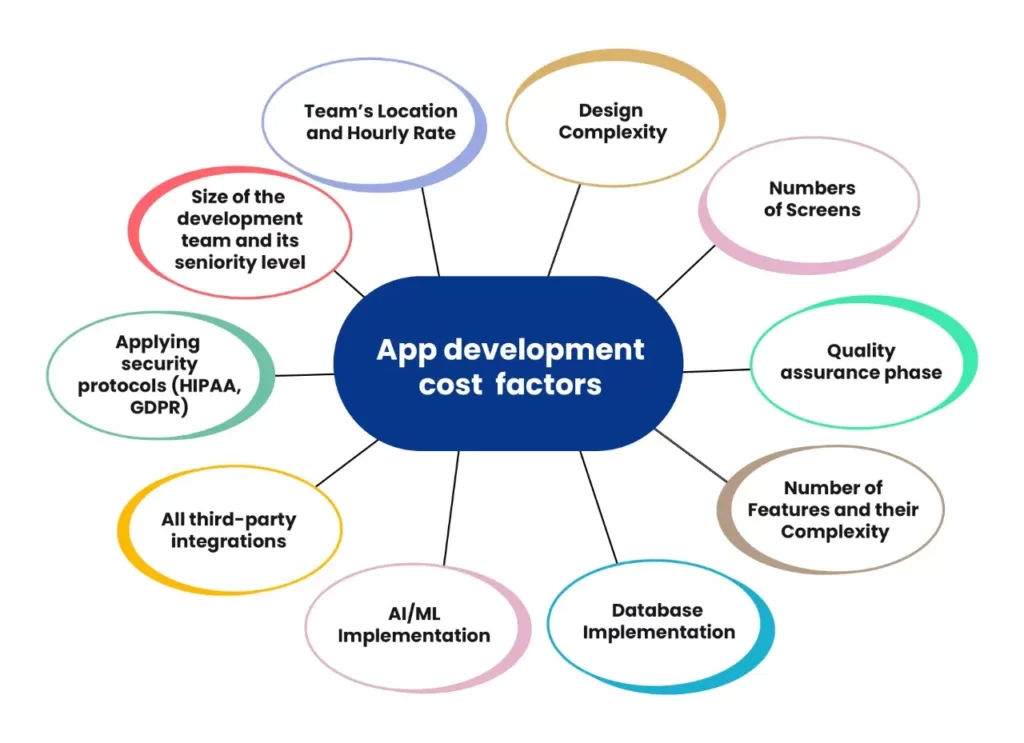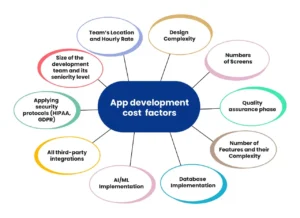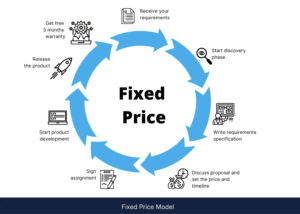Services
Service Tailored Solutions for Your Needs Explore our range of services designed to help you achieve your goals efficiently and effectively Ask our experts 12+

Frequently, our clientele inquires about the pricing associated with mobile app development. The response exhibits a casual tone. Here's an alternative with a more formal approach: "The cost typically ranges from £15,000 to £100,000, with variability dependent on factors such as the incorporated features and the developmental stage of the mobile application."
One of the initial questions we frequently get from potential clients looking to build an app is, “What will the cost be associated with developing my mobile app?”.
It is inherently challenging to provide a definite response to this question, considering the numerous factors and intricate nature at play. However, we shall exert our utmost effort to offer you an approximate estimation of the potential expenses involved.
The pricing for the development of a mobile application will differ based on factors such as the app’s characteristics, intricacy, and the organization responsible for its creation. The pricing will also vary depending on the stage of progression. In the event that you have already finished the design work for the mobile app, you will incur a lower cost.
On average, a compact and straightforward mobile application with limited functionality will generally require an investment of approximately £15,000. A more substantial and intricate application with extensive integrations may exceed a budget of £100,000.
Creating a mobile application in the United Kingdom can entail substantial financial commitment. The pricing is determined by several factors, including but not limited to the level of intricacy, functionality, preferred platform, design elements, and estimated development timeframe. To offer an approximate projection, it would be beneficial to analyze the expenditure associated with the process of developing a mobile application in the United Kingdom.
1. Strategic Planning and Analysis: This encompasses conducting thorough market research, analyzing competitors, and establishing clear project objectives. The price for this phase may vary, ranging from £1,000 to £5,000, depending on the intricacy of the application.
2. Design: Design plays a pivotal role in the overall success of a mobile application, particularly in the realm of user interface (UI) and user experience (UX). The pricing for design services can exhibit considerable variations, with a range of £5,000 to £20,000, contingent upon the intricacy of the application and the design specifications.
3. App Development: The total development expenses are determined by factors such as app intricacy, feature quantity, and the desired platform reach (e.g., iOS, Android, or both). Typically, the costs for development range from £20,000 to £100,000, on average. Applications that possess intricate functionalities, encompassing advanced features, and are compatible across multiple platforms, often reside within the upper echelon of the pricing range.
The process of obtaining a more precise cost estimate commences by developing a comprehensive document detailing the requirements for a mobile app.
The requirements document outlines the functionalities and technical specifications for your application, facilitating the developer’s provision of a precise cost estimate for your application.
Do not be concerned, as the majority of application development agencies offer a convenient method to construct your project requirements. This could be a rudimentary form, a telephonic correspondence, or a standardized document format to initiate your proceedings.
At this juncture, your project may possess a level of complexity that renders it challenging for an individual scope determination. It is customary for developers of mobile applications to offer “Discovery workshops” which aim to assist you in comprehensively documenting your app.
These sessions typically require payment, but upon the conclusion of the workshop, you will receive a comprehensive briefing. With this, you may engage with agencies to obtain a quotation. Frequently, such documentation can lead to cost reductions in the project.
Investing in a workshop may evoke apprehension; however, it is worth considering that creating a comprehensive requirement brief can ultimately result in cost savings. This is particularly advantageous in situations where disputes may arise between the developer and yourself regarding the project’s scope upon completion.

In essence, the cost of your mobile application rises proportionally to the coding duration. The question that we frequently receive from individuals seeking to develop an application, ranking second in terms of frequency, pertains to the anticipated timeline for completing the app development process.
The selection of platforms for your application can have a substantial influence on the overall cost. Due to the utilization of distinct programming languages on iOS and Android, the development of native apps requires the creation of two separate versions of the application.
Hybrid applications, developed using the HTML5 framework, serve as a viable substitute for Native applications. We will elaborate on the utilization of Hybrid apps as a means of cost optimization for your project at a later point in time.
Currently, there are mobile application frameworks available, such as Flutter and React, that facilitate the development of cross-platform applications using a unified code base. This can potentially mitigate the expenses associated with your initial investment; however, it is crucial to consider that due to the novelty of platforms like Flutter, procuring proficient developers may present a formidable challenge.
Apps which us complex, native features will cost more. Using features such as Bluetooth, push notifications and GPS will push your price up.
Your app might require an API (Application programming interface). An API might be used to show information from a third party. Your API might store data into your database to use later. Having an API will increase the cost of your app depending on what’s needed.
You may need a Content Management System (CMS) to manage the content within your app. This will allow you to change wording within the app without submitting a new version to the app stores.
Design can play a big part in the cost of your app. Complicated designs which use non-standard components will increase the cost.
Apps often feature bespoke graphics and animations which will also require the time of a specialist designer and animator to create.
Keeping the design of your app simple will save you money
The experience and skill of the team building your app will impact the price.
A college graduate with little to no experience will command less of a fee than an experienced award-winning International agency.
Programmers without experience often won’t understand your requirements, costing you both time and money. It’s important to find a balance between price and expertise to ensure you get what you want.
Occasionally, when we engage in the process of car shopping, we may find ourselves unable to financially acquire the desired model accompanied by all the available luxurious features. Hence, it is customary for us to modify our specifications and procure a more cost-effective alternative. However, it remains an automobile.
The process of app development bears semblance. It is advisable to narrow down the parameters of your project by concentrating on an MVP (Minimum viable product). Your Minimum Viable Product (MVP) encompasses the essential features needed to deliver a resilient and effective solution to your users. In addition to reducing costs and expediting the development process, it affords the opportunity to enhance your app through the incorporation of user feedback post-launch. You may discover that your users have distinct preferences that deviate from your proposed concepts.
Another way of saving money is to build a “Hybrid ” app. Often Hybrid apps are built with HTML5 which works cross-platform. This means you develop one app and it works on iOS and Android. This means you save the cost of making a specific iOS and Android version.
Hybrid apps often don’t feel as good as Native apps and have limited access to some features. If you’re developing an app which requires these features you might be better looking at developing your app natively.
If you need to develop a Native app, it is possible to mitigate costs by focusing the development solely on a single platform. Either iOS or Android.
You deploy an initial iteration of the application to validate a concept, obtain user insights, or secure financing prior to developing the alternative version.
Although you may express uncertainty in coding abilities, the positive update is that it is no longer mandatory. The accessibility of NoCode and Low Code platforms has noticeably facilitated the entry for individuals seeking to embark on mobile app development.
Are these tools perfect? No, they definitely are not. However, they could potentially meet your requirements sufficiently to validate your concept and instill the necessary confidence, or generate revenue, to advance the development of your mobile application even more extensively.
We are an expert mobile app development company that specializes in building native iOS and Android applications.
You’ve already read this far and know roughly what we charge and how it increases the price, so no need to be scared and just shoot us a message.
If you’d like any help scoping out your project, developing your apps, or requiring some advice, get in touch, and we’ll be delighted to help you.
Service Tailored Solutions for Your Needs Explore our range of services designed to help you achieve your goals efficiently and effectively Ask our experts 12+

Selecting the appropriate contractual framework is a critical decision when embarking on a partnership with a software development firm. The objective is to avoid the
